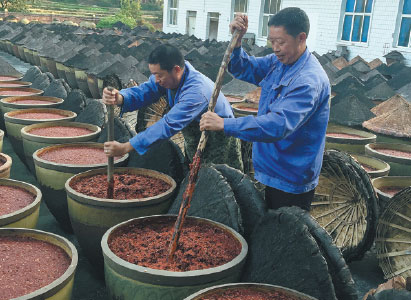Cities hold key to solving rural problems
Updated: 2016-02-19 08:08
By Li Fangchao(China Daily)
|
||||||||
 |
|
Workers process hot pepper sauce at Yiliuxiang Food Co in Shizhu county, Chongqing. The company is one of the beneficiaries of the poverty relief financial programs. [Photo by Tan Yingzi / China Daily] |
First, a woman from Shanghai caused an uproar after she posted online about her experience of accompanying her boyfriend to his hometown in a poor village in Central China's Jiangxi province during the Spring Festival.
She said in a post that she was "deeply shocked" by how poor his family is. Their relations came to a sudden end as she decided to return to Shanghai the same night.
Then a reporter with Caijing, a business magazine, lamented in an article the moral deterioration he found in his hometown, a small village in Northeast China, when he returned during the holiday.
An elderly woman was beaten up by her daughter-in-law simply because the daughter-in-law was not satisfied with the meal she cooked, and a group of young women, tried to attract rich men to marry through WeChat, a popular instant messaging app, the reporter wrote in his story.
Last but not least, a Xinhua News Agency report revealed that migrant workers, who had returned to their villages in Anhui province for their annual family reunions, gambled away all their hard-earned earnings for the preceding year in just a few days playing mahjong.
It has almost become a norm that each year during the Spring Festival, such stories focusing on the dark side of rural life hit the headlines.
But problems, such as gambling, have always been prevalent in rural areas. They are not phenomena that only appear at this time of year. Yet sadly, only when thousands of millions of people leave the cities where they work for their annual homecomings are these problems in the public eye.
Like a virgin island that has never been explored, the vast rural areas seem to suddenly come into sight during the Spring Festival, only to gradually recede and fade from view after people return to the cities.
These stories, in a sense, are like an annual writing competition with the theme "Discover Rural China".
Indeed, these stories, that often quote the hearsay and gossip heard at dining tables during reporters' short stays at home, do not fully reflect the whole picture of rural life.
However, the problems and attitudes revealed in these stories should not be lightly dismissed.
Despite the nation's unremitting efforts to speed up urbanization and change the backward situation in its rural areas, the problems in the countryside remain severe.
Paradoxically, it is the cities that hold the key to solving many rural problems.
The huge number of migrant workers who toil in the cities now account for a majority of the floating population in the cities. Like other residents, they eat, live, raise children and pay taxes in the cities, but unlike the other residents they still possess a rural hukou, or household registration.
These small pieces of paper that tie them to their rural hometowns deny them welfare such as education and medical treatment that are enjoyed by those who have an urban hukou.
The difficulty they have in sending their children to schools in cities is one of the reasons for the huge number of left-behind children in the countryside.
And without the medical insurance enjoyed by urban residents, the unbearably high costs of medical fees at big hospitals in the cities finally drive many of them away.
The central government's first policy issued this year stressed the importance of hukou reform, which aims to gradually grant the migrant population the same rights as urban residents. If they can settle down in the cities, some of the rural problems will disappear.
So instead of hitting headlines briefly during the Spring Festival each year, the problems of the rural areas deserve constant attention and more efforts to allow migrant workers to settle in the cities permanently.
The writer is an editor with China Daily. lifangchao@chinadaily.com.cn
- Global health entering new era: WHO chief
- Brazil's planning minister steps aside after recordings revelation
- Vietnam, US adopt joint statement on advancing comprehensive partnership
- European border closures 'inhumane': UN refugee agency
- Japan's foreign minister calls A-bombings extremely regrettable
- Fukushima impact unprecedented for oceans: US expert

 Stars of Lijiang River: Elderly brothers with white beards
Stars of Lijiang River: Elderly brothers with white beards
 Wealthy Chinese children paying money to learn British manners
Wealthy Chinese children paying money to learn British manners
 Military-style wedding: Fighter jets, grooms in dashing uniforms
Military-style wedding: Fighter jets, grooms in dashing uniforms
 Striking photos around the world: May 16 - May 22
Striking photos around the world: May 16 - May 22
 Robots help elderly in nursing home in east China
Robots help elderly in nursing home in east China
 Hanging in the air: Chongqing holds rescue drill
Hanging in the air: Chongqing holds rescue drill
 2.1-ton tofu finishes in two hours in central China
2.1-ton tofu finishes in two hours in central China
 Six things you may not know about Grain Buds
Six things you may not know about Grain Buds
Most Viewed
Editor's Picks

|

|

|

|

|

|
Today's Top News
Liang avoids jail in shooting death
China's finance minister addresses ratings downgrade
Duke alumni visit Chinese Embassy
Marriott unlikely to top Anbang offer for Starwood: Observers
Chinese biopharma debuts on Nasdaq
What ends Jeb Bush's White House hopes
Investigation for Nicolas's campaign
Will US-ASEAN meeting be good for region?
US Weekly

|

|







